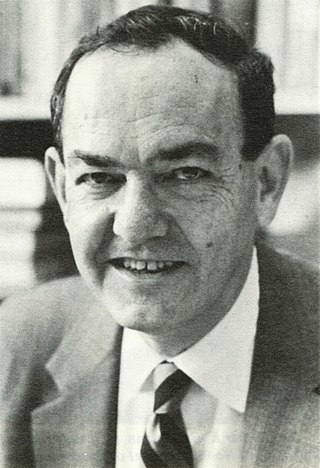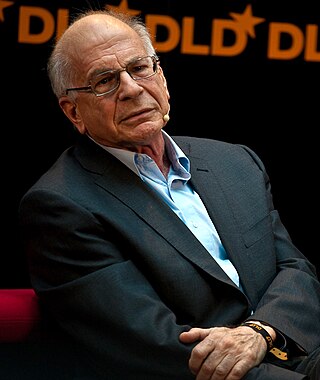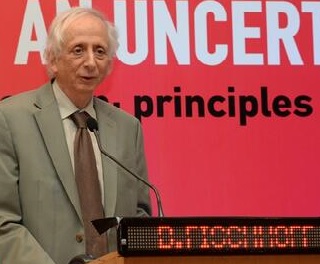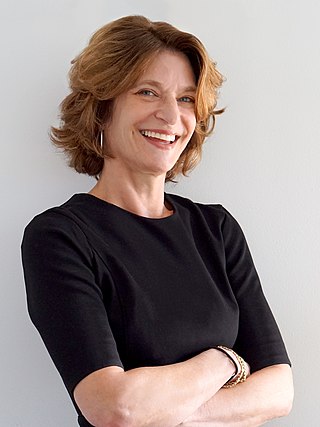
Herbert Alexander Simon was an American political scientist whose work also influenced the fields of computer science, economics, and cognitive psychology. His primary research interest was decision-making within organizations and he is best known for the theories of "bounded rationality" and "satisficing". He received the Nobel Memorial Prize in Economic Sciences in 1978 and the Turing Award in computer science in 1975. His research was noted for its interdisciplinary nature, spanning the fields of cognitive science, computer science, public administration, management, and political science. He was at Carnegie Mellon University for most of his career, from 1949 to 2001, where he helped found the Carnegie Mellon School of Computer Science, one of the first such departments in the world.

Daniel Kahneman was an Israeli-American author, psychologist, and economist notable for his work on hedonism, the psychology of judgment, and decision-making. He is also known for his work in behavioral economics, for which he was awarded the 2002 Nobel Memorial Prize in Economic Sciences shared with Vernon L. Smith. Kahneman's published empirical findings challenge the assumption of human rationality prevailing in modern economic theory. Kahneman became known as the "grandfather of behavioral economics."
The Department of Social and Decision Sciences (SDS) is an interdisciplinary academic department within the Dietrich College of Humanities and Social Sciences at Carnegie Mellon University. The Department of Social and Decision Sciences is headquartered in Porter Hall in Pittsburgh, Pennsylvania and is led by Department Head Gretchen Chapman. SDS has a world-class reputation for research and education programs in decision-making in public policy, economics, management, and the behavioral social sciences.

George Loewenstein is an American educator and economist. He is the Herbert A. Simon Professor of Economics and Psychology in the Social and Decision Sciences Department at Carnegie Mellon University and director of the Center for Behavioral Decision Research. He is a leader in the fields of behavioral economics, neuroeconomics, Judgment and Decision Making.

Lisa Feldman Barrett is a University Distinguished Professor of psychology at Northeastern University, where she focuses on affective science. She is a director of the Interdisciplinary Affective Science Laboratory. Along with James Russell, she is the founding editor-in-chief of the journal Emotion Review. Along with James Gross, she founded the Society for Affective Science.

Jennifer A. Richeson is an American social psychologist who studies racial identity and interracial interactions. She is currently the Philip R. Allen Professor of Psychology at Yale University where she heads the Social Perception and Communication Lab. Prior to her appointment to the Yale faculty, Richeson was Professor of Psychology and African-American studies at Northwestern University. In 2015, she was elected to the United States National Academy of Sciences. Richeson was elected to the American Philosophical Society in 2022. Since 2021, she has been a member of the President’s Council of Advisors on Science and Technology (PCAST).

Mahzarin Rustum Banaji FBA is an American psychologist of Indian origin at Harvard University, known for her work popularizing the concept of implicit bias in regard to race, gender, sexual orientation, and other factors.
Peter Salovey is an American social psychologist and academic administrator. He has been serving as the 23rd and current president of Yale University since 2013. He previously served as provost of Yale University from 2008 to 2013, dean of Yale College from 2004 to 2008, and dean of Yale Graduate School of Arts and Sciences from 2003 to 2004. Salovey is one of the early pioneers in emotional intelligence.
Shelley Elizabeth Taylor is an American psychologist. She serves as a distinguished professor of psychology at the University of California, Los Angeles. She received her Ph.D. from Yale University, and was formerly on the faculty at Harvard University. A prolific author of books and scholarly journal articles, Taylor has long been a leading figure in two subfields related to her primary discipline of social psychology: social cognition and health psychology. Her books include The Tending Instinct and Social Cognition, the latter by Susan Fiske and Shelley Taylor.
Robyn Mason Dawes was an American psychologist who specialized in the field of human judgment. His research interests included human irrationality, human cooperation, intuitive expertise, and the United States AIDS policy. He applied linear models to human decision making, including models with equal weights, a method known as unit-weighted regression. He co-wrote an early textbook on mathematical psychology.
Paula M. Niedenthal is a social psychologist currently working as a professor of psychology at the University of Wisconsin–Madison. She also completed her undergraduate studies at the University of Wisconsin at Madison where she received a Bachelor's in Psychology. She then received her Ph.D. at the University of Michigan before becoming a faculty member of the departments of Psychology at Johns Hopkins University and Indiana University. Until recently, she served as the Director of Research in the National Centre for Scientific Research at the Université Blaise Pascal in Clermont-Ferrand France. The majority of Niedenthal's research focuses on several levels of analysis of emotional processes, this would include emotion-cognition interaction and representational models of emotion. Niedenthal has authored more than 80 articles and chapters, and several books. Niedenthal is a fellow of the Society for Personality and Social Psychology.
Sheldon Cohen is the Robert E. Doherty University Professor of Psychology at Carnegie Mellon University. He is the director of the Laboratory for the Study of Stress, Immunity and Disease. He is a member of the Department of Psychology at Carnegie Mellon and adjunct professor of Psychiatry and of Pathology at the University of Pittsburgh School of Medicine.
Denise Rousseau is a professor at Carnegie Mellon University. She holds an H.J. Heinz III Chair in Organizational Behavior and Public Policy, Heinz College and jointly Tepper School of Business.
Eleanor Emmons Maccoby was an American psychologist who was most recognized for her research and scholarly contributions to the fields of gender studies and developmental psychology. Throughout her career she studied sex differences, gender development, gender differentiation, parent-child relations, child development, and social development from the child perspective.

Baruch Fischhoff is an American academic who is the Howard Heinz University Professor in the Institute for Strategy and Technology and the Department of Engineering and Public Policy at Carnegie Mellon University. He is an elected member of the (US) National Academy of Sciences and National Academy of Medicine. His research focuses on judgment and decision making, including risk perception and risk Analysis. He has numerous academic books and articles. Fischhoff completed his graduate education at the Hebrew University of Jerusalem under the supervision of Daniel Kahneman and Amos Tversky.

Karen E. Adolph is a psychologist and professor known for her research in the field of infant motor development. She is the 2017 recipient of the Kurt-Koffka medal from the University of Giessen. Previous honors include the 1999 APA Boyd McCandless Award and 2002 American Psychological Foundation Robert L. Fantz Memorial Award. She has served as the President of the International Congress on Infant Studies. Adolph and her colleagues developed computerized video coding software, called Datavyu, and state-of-the-art recording technology to observe and code behavior. A related project, Databrary, provides a repository for video recordings of behavior and encourages open data sharing across research labs. Adolph is a recipient of a MERIT Award from the National Institutes of Child Health and Human Development in support of her innovative research.
Monica Rose Biernat is a social psychologist known for her research on social judgment, stereotyping, prejudice, and discrimination. She is a University Distinguished Professor of Psychology at the University of Kansas.
Margaret (“Peggy”) Sydnor Clark is an American psychologist.
Gretchen Chapman is a cognitive psychologist known for her work on judgment and decision making in health-related contexts, such as clinical decision making and patient preferences, preventive health behavior, and vaccination. She is Professor of Social and Decision Sciences at Carnegie Mellon University. Chapman served as an Editor of the journal Psychological Science and is a Fellow of the Association for Psychological Science.
June Gruber is an American psychologist. She is associate professor of Psychology and Neuroscience and Director of the Positive Emotion and Psychopathology Laboratory at the University of Colorado Boulder. She is known for her research on positive affectivity and mental health. She is a licensed clinical psychologist.







